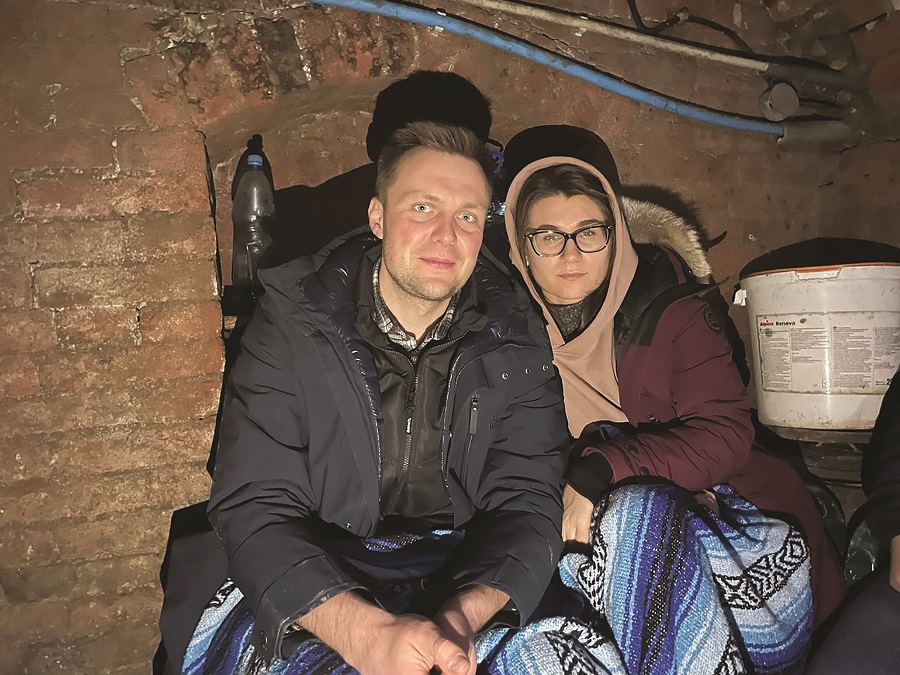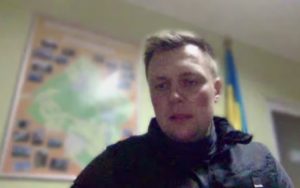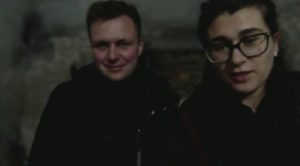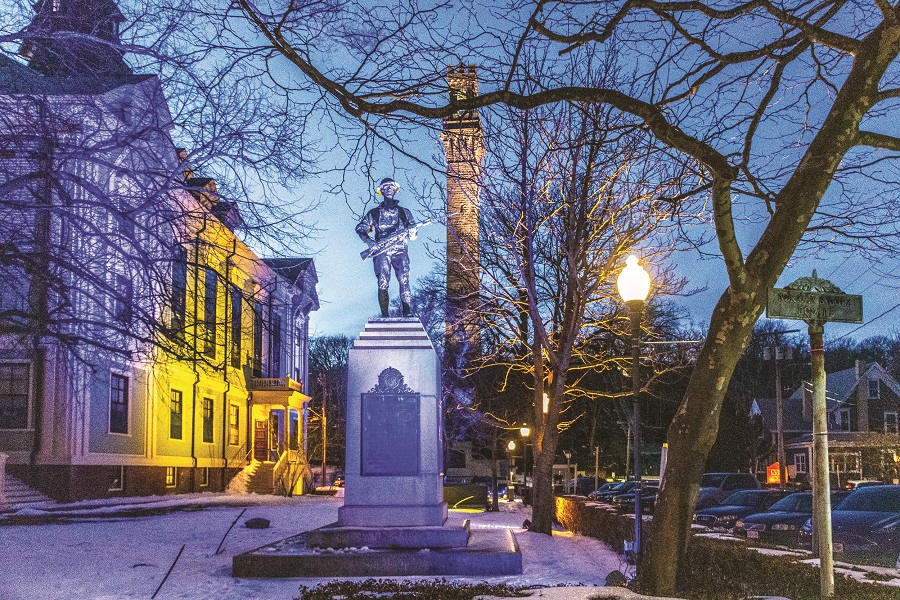In a one-hour conversation on Tuesday, Bogdan Kelichavyi had to relocate four times. He began our video call in his town hall office in Kopychyntsi, Ukraine but was interrupted almost immediately by the sound of air-raid sirens. He and his wife moved down two flights of stairs to a dark basement.
Kelichavyi is the elected mayor of a town and 11 villages, with a combined population of about 13,500. At 30, he is the second youngest mayor in Ukraine.
Kopychyntsi is in the western part of Ukraine, closer to Romania and Poland than to the capital, Kyiv, so his work lately has included sending soldiers to the front lines in the east, receiving refugees who are headed west, and setting up and arming a local defense force for his own town.
Amidst all this, he has been reaching out to his friends overseas to tell the story of his town and his country.
Mayor Kelichavyi met Brit Fontenot at conferences in Kyiv in 2019 and Portland, Ore. in 2021. Brit had been a State Dept. fellow in Ukraine and is now economic development director for Bozeman, Mont. Brit’s brother, Edouard Fontenot, lives in Truro and writes for the Independent.

What is your town like in normal times?
In normal life, my town is the sausage capital of Ukraine! We have a lot of sausage factories here. We have very fertile soil, so there are other crops for export. And there’s a hospital that serves several other communities.
How and when did you became mayor?
It was October 2020 when I won the election with my team. My wife, Mariya, and I were working in Kyiv — but we would spend weekends here, organizing projects and building our names. There were four candidates, including the ex-mayor, and it was a tough fight. But it was quite honest and very democratic.
Ukrainians really value our freedom and democracy. I think you can see, from how we fight.
Russia attacked Ukraine eight years ago, in Crimea and in the Donbas. How did this change what people in Ukraine thought was possible?
What is happening is insane, actually. But as we can see now, nothing can stop Putin except resistance. There is no way to convince him. He only understands the language of power.
The world was allowing him to take what he wants, and this increased his appetite. Because he started in Moldova, and then Georgia twice, and then Crimea. And he won’t stop here. He would like to take the Baltic countries, Moldova and Romania, Hungary, Finland, everything else.
It’s not only the Ukrainians’ war. It’s a global crisis, and a global war.
What does it feel like, in your small town, as all of this happens?
In my town, the last six days is like six months.
We have sent 30 men to the front lines, reserve soldiers that have previous experience from the Donbas war. We have about 500 who would like to join the local defense, who have registered and come to the assemblies for that. Just before your call, we had a call with the governor of the region, who said if we register our units they will send us Kalashnikovs. So, we are selecting 144 men, which makes one unit. The guns are 12 to a box, so they want multiples of 12.
We are also receiving a lot of refugees, because it’s relatively calm here, and people are choosing smaller towns with less infrastructure so they will be more secure. This creates a little bit of a crisis.

How many refugees do you think you have?
I think an extra 2,000 people. Some of them are from far-away cities, and some of them have relatives here that they’re staying with. We have people staying in the kindergarten. We have these tiny beds for kids. You put three of them together sideways and it becomes like a king-size bed.
How is the grocery situation?
The first day, everybody emptied the shelves. And it was the easiest part for me because no one was calling me — they were busy saving themselves. Now, everybody wants to help somehow, but it’s not that easy to offer them this opportunity. We started telling people, please improve our shelters, install wi-fi and clean them, any kind of jobs so they can keep themselves busy.
Also, now people need space and they’re deciding they bought too many groceries. So, they’re bringing them to us. We think we’re going to cater for our nightwatch volunteers.
So the delivery trucks are still coming?
More or less. Sometimes the ATMs are empty. We ran out of diesel. And, of course, I’m talking about my town. Kyiv is on fire. Kharkiv is on fire. Kherson is on fire.
Some refugees are staying in smaller towns because it feels safer?
Yes. And they’re staying because they want to help. My wife and I are hosting five Crimean Tatars. They’re the original people of Crimea. They’re internally displaced for the second time now — they went to Kyiv eight years ago, and now they’re here. One of them was accepted to Harvard Medical School, but now he’s staying to help prepare our hospital. And another one is helping improve all our shelters. They understand the importance of well-prepared shelters.

How much have those last eight years changed the country, made people ready?
War makes you value your country better and value your freedom more. We had a terrible experience, a lot of our men died during that war.
It may sound surprising to you, but Ukraine always had its identity, its own language and culture and mentality. I’m pretty sure many people wouldn’t distinguish much between Ukraine and Russia. Now everybody can see that these are very different countries with very different values.
We are not going to give up. We are going to fight and show the world that we want to have normal dreams and normal careers. We believe in our country.
What do you want people to hear, or to do?
This is not only our war, this is a global war. We need to stand together against aggression. If you really support us, speak up loudly, show your position. Show it to your local government, and your federal government — in a nice way, a civilized way — but just be with us. We will be with you, when you need it.
I hope we will not be forgotten. Right now, Ukraine is in the headlines, but maybe the world will get used to it. This can become unresolvable, and then it will take another eight years for someone to realize that some values should be protected.
People here are worried for you, and we are proud of you.
Thank you. I hope someday we’ll see each other. I hope you’ll be able to visit Ukraine and see it in new colors. And I hope we’ll be able to defend our country, protect what we have here. And maybe I’ll see you, here or somewhere else.




